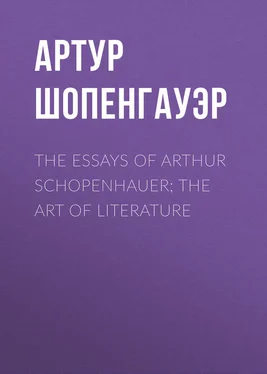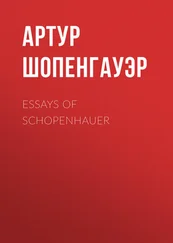Артур Шопенгауэр - The Essays of Arthur Schopenhauer; The Art of Literature
Здесь есть возможность читать онлайн «Артур Шопенгауэр - The Essays of Arthur Schopenhauer; The Art of Literature» — ознакомительный отрывок электронной книги совершенно бесплатно, а после прочтения отрывка купить полную версию. В некоторых случаях можно слушать аудио, скачать через торрент в формате fb2 и присутствует краткое содержание. Жанр: Философия, literature_19, foreign_antique, foreign_prose, на английском языке. Описание произведения, (предисловие) а так же отзывы посетителей доступны на портале библиотеки ЛибКат.
- Название:The Essays of Arthur Schopenhauer; The Art of Literature
- Автор:
- Жанр:
- Год:неизвестен
- ISBN:нет данных
- Рейтинг книги:3 / 5. Голосов: 1
-
Избранное:Добавить в избранное
- Отзывы:
-
Ваша оценка:
- 60
- 1
- 2
- 3
- 4
- 5
The Essays of Arthur Schopenhauer; The Art of Literature: краткое содержание, описание и аннотация
Предлагаем к чтению аннотацию, описание, краткое содержание или предисловие (зависит от того, что написал сам автор книги «The Essays of Arthur Schopenhauer; The Art of Literature»). Если вы не нашли необходимую информацию о книге — напишите в комментариях, мы постараемся отыскать её.
The Essays of Arthur Schopenhauer; The Art of Literature — читать онлайн ознакомительный отрывок
Ниже представлен текст книги, разбитый по страницам. Система сохранения места последней прочитанной страницы, позволяет с удобством читать онлайн бесплатно книгу «The Essays of Arthur Schopenhauer; The Art of Literature», без необходимости каждый раз заново искать на чём Вы остановились. Поставьте закладку, и сможете в любой момент перейти на страницу, на которой закончили чтение.
Интервал:
Закладка:
Every mediocre writer tries to mask his own natural style, because in his heart he knows the truth of what I am saying. He is thus forced, at the outset, to give up any attempt at being frank or naïve – a privilege which is thereby reserved for superior minds, conscious of their own worth, and therefore sure of themselves. What I mean is that these everyday writers are absolutely unable to resolve upon writing just as they think; because they have a notion that, were they to do so, their work might possibly look very childish and simple. For all that, it would not be without its value. If they would only go honestly to work, and say, quite simply, the things they have really thought, and just as they have thought them, these writers would be readable and, within their own proper sphere, even instructive.
But instead of that, they try to make the reader believe that their thoughts have gone much further and deeper than is really the case. They say what they have to say in long sentences that wind about in a forced and unnatural way; they coin new words and write prolix periods which go round and round the thought and wrap it up in a sort of disguise. They tremble between the two separate aims of communicating what they want to say and of concealing it. Their object is to dress it up so that it may look learned or deep, in order to give people the impression that there is very much more in it than for the moment meets the eye. They either jot down their thoughts bit by bit, in short, ambiguous, and paradoxical sentences, which apparently mean much more than they say, – of this kind of writing Schelling's treatises on natural philosophy are a splendid instance; or else they hold forth with a deluge of words and the most intolerable diffusiveness, as though no end of fuss were necessary to make the reader understand the deep meaning of their sentences, whereas it is some quite simple if not actually trivial idea, – examples of which may be found in plenty in the popular works of Fichte, and the philosophical manuals of a hundred other miserable dunces not worth mentioning; or, again, they try to write in some particular style which they have been pleased to take up and think very grand, a style, for example, par excellence profound and scientific, where the reader is tormented to death by the narcotic effect of longspun periods without a single idea in them, – such as are furnished in a special measure by those most impudent of all mortals, the Hegelians 1 1 In their Hegel-gazette, commonly known as Jahrbücher der wissenschaftlichen Literatur .
; or it may be that it is an intellectual style they have striven after, where it seems as though their object were to go crazy altogether; and so on in many other cases. All these endeavors to put off the nascetur ridiculus mus – to avoid showing the funny little creature that is born after such mighty throes – often make it difficult to know what it is that they really mean. And then, too, they write down words, nay, even whole sentences, without attaching any meaning to them themselves, but in the hope that someone else will get sense out of them.
And what is at the bottom of all this? Nothing but the untiring effort to sell words for thoughts; a mode of merchandise that is always trying to make fresh openings for itself, and by means of odd expressions, turns of phrase, and combinations of every sort, whether new or used in a new sense, to produce the appearence of intellect in order to make up for the very painfully felt lack of it.
It is amusing to see how writers with this object in view will attempt first one mannerism and then another, as though they were putting on the mask of intellect! This mask may possibly deceive the inexperienced for a while, until it is seen to be a dead thing, with no life in it at all; it is then laughed at and exchanged for another. Such an author will at one moment write in a dithyrambic vein, as though he were tipsy; at another, nay, on the very next page, he will be pompous, severe, profoundly learned and prolix, stumbling on in the most cumbrous way and chopping up everything very small; like the late Christian Wolf, only in a modern dress. Longest of all lasts the mask of unintelligibility; but this is only in Germany, whither it was introduced by Fichte, perfected by Schelling, and carried to its highest pitch in Hegel – always with the best results.
And yet nothing is easier than to write so that no one can understand; just as contrarily, nothing is more difficult than to express deep things in such a way that every one must necessarily grasp them. All the arts and tricks I have been mentioning are rendered superfluous if the author really has any brains; for that allows him to show himself as he is, and confirms to all time Horace's maxim that good sense is the source and origin of good style:
Scribendi recte sapere est et principium et fons .
But those authors I have named are like certain workers in metal, who try a hundred different compounds to take the place of gold – the only metal which can never have any substitute. Rather than do that, there is nothing against which a writer should be more upon his guard than the manifest endeavor to exhibit more intellect than he really has; because this makes the reader suspect that he possesses very little; since it is always the case that if a man affects anything, whatever it may be, it is just there that he is deficient.
That is why it is praise to an author to say that he is naïve ; it means that he need not shrink from showing himself as he is. Generally speaking, to be naïve is to be attractive; while lack of naturalness is everywhere repulsive. As a matter of fact we find that every really great writer tries to express his thoughts as purely, clearly, definitely and shortly as possible. Simplicity has always been held to be a mark of truth; it is also a mark of genius. Style receives its beauty from the thought it expresses; but with sham-thinkers the thoughts are supposed to be fine because of the style. Style is nothing but the mere silhouette of thought; and an obscure or bad style means a dull or confused brain.
The first rule, then, for a good style is that the author should have something to say ; nay, this is in itself almost all that is necessary. Ah, how much it means! The neglect of this rule is a fundamental trait in the philosophical writing, and, in fact, in all the reflective literature, of my country, more especially since Fichte. These writers all let it be seen that they want to appear as though they had something to say; whereas they have nothing to say. Writing of this kind was brought in by the pseudo-philosophers at the Universities, and now it is current everywhere, even among the first literary notabilities of the age. It is the mother of that strained and vague style, where there seem to be two or even more meanings in the sentence; also of that prolix and cumbrous manner of expression, called le stile empesé ; again, of that mere waste of words which consists in pouring them out like a flood; finally, of that trick of concealing the direst poverty of thought under a farrago of never-ending chatter, which clacks away like a windmill and quite stupefies one – stuff which a man may read for hours together without getting hold of a single clearly expressed and definite idea. 2 2 Select examples of the art of writing in this style are to be found almost passim in the Jahrbücher published at Halle, afterwards called the Deutschen Jahrbücher .
However, people are easy-going, and they have formed the habit of reading page upon page of all sorts of such verbiage, without having any particular idea of what the author really means. They fancy it is all as it should be, and fail to discover that he is writing simply for writing's sake.
Интервал:
Закладка:
Похожие книги на «The Essays of Arthur Schopenhauer; The Art of Literature»
Представляем Вашему вниманию похожие книги на «The Essays of Arthur Schopenhauer; The Art of Literature» списком для выбора. Мы отобрали схожую по названию и смыслу литературу в надежде предоставить читателям больше вариантов отыскать новые, интересные, ещё непрочитанные произведения.
Обсуждение, отзывы о книге «The Essays of Arthur Schopenhauer; The Art of Literature» и просто собственные мнения читателей. Оставьте ваши комментарии, напишите, что Вы думаете о произведении, его смысле или главных героях. Укажите что конкретно понравилось, а что нет, и почему Вы так считаете.












